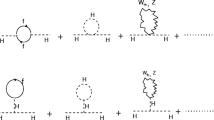Abstract
Requirements for a Fundamental Physical Theory. The search for a so-called ‘Theory of Everything’ which should lead to the unification of all fundamental forces is seen, at present, as a matter of priority within theoretical high-energy physics. Some physicist identify this Theory of Everything today with aspecific type of superstring theory or its intended conceptual continuation, called M-Theory. The objective of this article is the discussion of the requirements a fundamental physical theory has to comply with. This question can only be clarified if one takes into account that the claim that a physical theory is all-encompassing takes forgranted some tacit prerequisites which concern the conceptual and epistemological foundations of science and, not least, the question for the realizability of its reductionistic unity.
Similar content being viewed by others
LITERATUR
Barrow, J.D.: 1991, Theories of Everything, Oxford.
Cherniak, C.: 1986, Minimal Rationality, Cambridge, Mass.
Davidson, D.: 1987, Eine Kohärenztheorie der Wahrheit und der Erkenntnis',in: Bieri, P. (Hg.): Analytische Philosophie der Erkenntnis, Frankfurt am Main, 271–290.
Davies, P. / Brown, J.R.: 1992, Superstrings. Eine Allumfassende Theorie der Natur in der Diskussion, München.
Duff, M.J.: 1998, 'The Theory Formerly Known as Strings', Scientific American (Feb.1998) 54–59.
Duhem, P.: 1908, La theorie physique. Son objet et sa structure, Paris.
Feyerabend, P.K.: 1962, 'Explanation, Reduction and Empiricism', Minnesota Studies in the Philosophy of Science 3, 28–97; dt.:,Erklärung, Reduktion und Empirismus', in: ders.: Probleme des Empirismus, Braunschweig (1981) 73–125.
Feyerabend, P.K.: 1975, Against Method. Outline of an Anarchistic Theory of Knowledge, London.
Flam, F.: 1992, 'The Quest for a Theory of Everything Hits Some Snags', Science 256, 1518f.
Ginsparg, P. / Glashow, S.: 1986, 'Desperately seeking superstrings?', Physics Today 39/5, 7–9.
Green, M.B.: 1985, 'Unification of forces and particles in superstring theories', Nature 314, 409–414.
Green, M.B.: 1986, 'Superstrings', Scientific American 255/3, 44–56. 60 REINER HEDRICH
Green, M.B. / Schwarz, J.H. / Witten, E.: 1987, Superstring Theory, 2 Vols., Cambridge.
Greene, B.: 2000, Das elegante Universum: Superstrings, verborgene Dimensionen und die Suche nach der Weltformel, Berlin.
Hatfield, B.F.: 1992, Quantum Field Theory of Point Particles and Strings, Reading, Mass.
Hempel, C.G. / Oppenheim, P.: 1948, 'Studies in the Logic of Explanation', Philosophy of Science 15, 135–175.
Horgan, J.: 1996, The End of Science: Facing the Limits of Knowledge in the Twilight of the Scientific Age, New York.
Howson, C. / Urbach, P.: 1989, Scientific Reasoning: The Bayesian Approach, La Salle.
Kane, G.: 1997, 'String Theory is Testable, Even Supertestable', Physics Today 50/2, 40–42.
Kemeny, J. / Oppenheim, P.: 1956, 'On Reduction', Philosophical Studies 7, 6–19.
Matthews, R.: 1994, 'Can gravity take a quantum leap?', New Scientist (10. Sep. 1994) 28–32.
Nagel, E.: 1961, The Structure of Science, London.
Neurath, O.: 1979, Wissenschaftliche Weltauffassung, Sozialismus und Logischer Empirismus, Frankfurt am Main.
Oppenheim, P. / Putnam, H.: 1958, 'Unity of Science as a Working Hypothesis', in: Feigl, H. et al. (Eds.): Minnesota Studies in the Philosophy of Science 2, 3–36.
Polchinski, J.G.: 2000, Superstring Theory and Beyond, Cambridge.
Putnam, H.: 1982, Vernunft, Wahrheit und Geschichte, Frankfurt am Main.
Quine, W.V.O.: 1953, 'Two dogmas of empiricism', in: ders.: From a Logical Point of View, Cambridge, Mass.
Schaffner, K.F.: 1967, 'Approaches to reduction', Philosophy of Science 34/2, 137–147.
Schwarz, J.H.: 1984, 'What are Superstrings?', Comments on Nuclear Particle Physics 13/3, 102–115.
Schwarz, J.H. (Ed.): 1985, Superstrings: The First 15 Years of Superstring Theory, 2Vols., Singapore.
Schwarz, J.H.: 1987, 'Superstrings', Physics Today 40/11, 33–40.
Spector, M.: 1978, Concepts of Reduction in Physical Science, Philadelphia.
Taubes, G.: 1995, 'A Theory of Everything Takes Shape', Science 269, 1511–1513.
Winkler, R.L.: 1972, Introduction to Bayesian Inference and Decision, New York.
Witten, E.: 1997, 'Duality, Spacetime and Quantum Mechanics', Physics Today 50/5, 32.
Yoshida, R.M.: 1977, Reduction in the Physical Sciences, Halifax. Zentrum für Philosophie und Grundlagen der Wissenschaft Justus-Liebig-Universität Giessen Otto-Behaghel-Strasse 10 C II D 35394 Giessen
Author information
Authors and Affiliations
Rights and permissions
About this article
Cite this article
Hedrich, R. Anforderungen an eine physikalische Fundamentaltheorie. Journal for General Philosophy of Science 33, 23–60 (2002). https://doi.org/10.1023/A:1020723825663
Issue Date:
DOI: https://doi.org/10.1023/A:1020723825663




